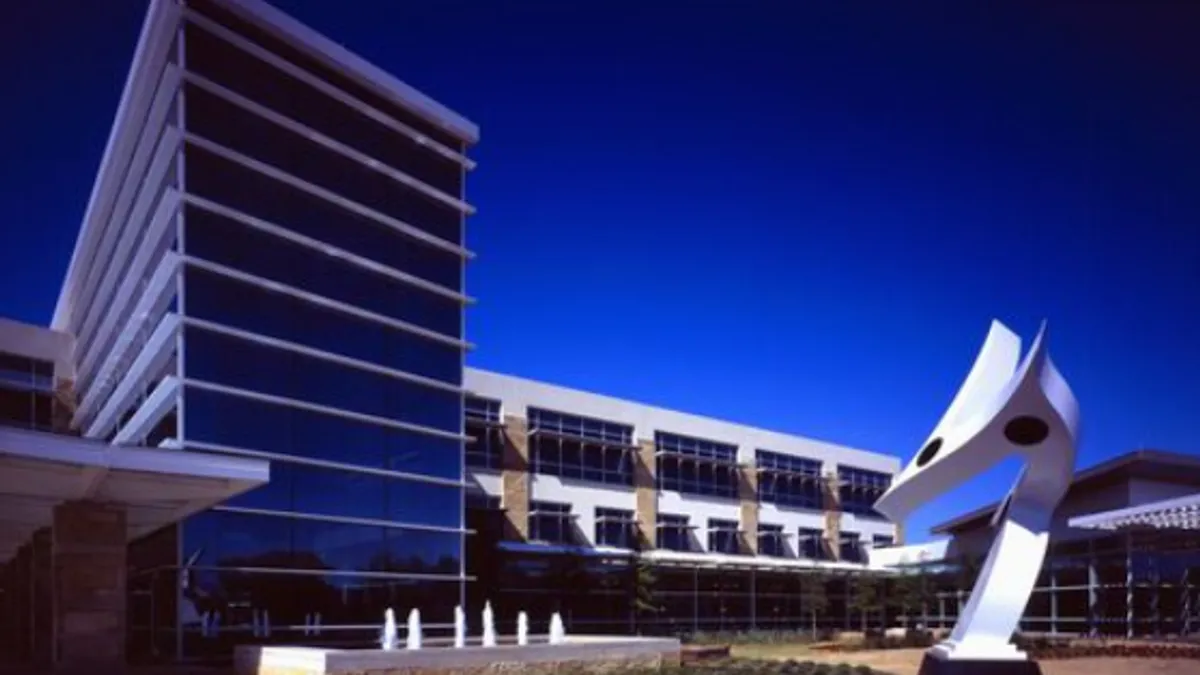Dive Brief:
- While still under the cloud of an SEC investigation, Irving, Texas-based Fluor released third-quarter 2020 operating results Thursday to get current with its required financial reporting, while disclosing revenue of $3.8 billion, an 18% decline from its $4.63 billion revenues during the third quarter of 2019.
- The firm said it was still experiencing disruptions in its business from the COVID-19 pandemic, while navigating the finer points of making force majeure claims with clients on some projects, as its backlog also declined to $27.8 billion, a 13% drop from the $31.9 billion it reported a year ago.
- Despite those downward trends, retiring CEO Carlos Hernandez sounded a number of optimistic notes on the investor call. He highlighted wins in the firm’s life sciences business building vaccine facilities, a recent uptick in its mining segment as demand for copper and gold rises due to increased electrification around the globe and renewed interest in its NuScale small modular reactor technology, as markets around the world pursue more renewable energy solutions.
Dive Insight:
The results came as Fluor looks to regain its footing after a restructuring to put accounting mishaps behind it. The company is now pursuing higher-quality contracts, even as it continues to work through older, “zero margin” jobs. The firm didn't mention the SEC investigation on its call, but disclosed that it was still ongoing in a required regulatory filing.
Hernandez said the decline in backlog wasn’t solely tied to the pandemic. Instead, he said that the firm was being more selective about the jobs it was taking on, while pruning contracts where risk is higher and outcomes aren’t as favorable.
“While we do see a pipeline of projects, we will only pursue the ones that fit our revised criteria as we focus on delivering consistent profitability,” Hernandez said. “Backlog will decline somewhat, but it will be good backlog.”
A prime example: Fluor recently exited the highly contentious Purple Line project with the Maryland Department of Transportation, which had run into skyrocketing cost overruns. “The termination of the Purple Line project has been a very favorable development for us,” Hernandez said.
Client concerns
Like many contractors, the firm is keeping a close eye on new potential government restrictions as COVID-19 hospitalizations and deaths continue to break records in the U.S., he said. The firm has also had to push back on clients in the constantly changing COVID-19 landscape to revisit contracts that have been impacted and exercise force majeure clauses.
“We are negotiating with the clients on the effects of the COVID impact, both as to schedule and as to cost,” Hernandez said. “There is no question that there will be compensation to the contractor for impacts beyond our control … the problem is that, obviously, we don’t know what the final COVID impacts are going to be until we get past the pandemic.”
Those impacts are also being felt by Fluor's clients, particularly in its energy and chemicals and mining and industrials sectors. “Given the ongoing pandemic and the commodity price fluctuations, we have seen a lot of the large mining projects we were expecting to be awarded in 2020 and 2021 get delayed,” Hernandez said.
At the same time, he said conditions in the sector are improving. “I’m optimistic that mining will actually begin to resurface as a major activity area for us,” Hernandez said. “As the world becomes more electrified and copper becomes more necessary, I expect that we will be seeing copper and gold projects coming up.”
Pharmaceutical projects
The company won a new contract from Seqirus in Australia for a new influenza and antivenom cell culture facility, and Hernandez said the firm’s life sciences segment was fielding increased interest as companies around the world ramp up to manufacture massive amounts of vaccine to fight COVID-19.
“In the advanced technologies and life sciences, we’re actually working on some COVID-related facilities as well as other pharmaceutical-type of projects,” Hernandez said. “That is an area that we anticipate will have lots of opportunities for us.”
And with the recent approval by the Nuclear Regulatory Commission of the firm’s final design certification for its NuScale small modular reactor technology, an Oregon startup Fluor invested in in 2011 that simplifies the construction of nuclear power plants, he said there has been a surge in activity around the firm. “Since that approval, we have seen an increase in interest from potential customers, capital investors, manufacturers and supply chain partners to move forward in our development efforts,” Hernandez said.
Indeed, Alan Boeckmann, Fluor’s executive chairman, echoed comments made by Los Angeles-based AECOM last month, when asked by an analyst on the call if the incoming Biden administration’s decarbonization push would provide opportunities for Fluor.
“The answer to that is yes,” Boeckmann said. “NuScale really got its boost and started moving forward under the Obama administration … In fact, if anything, it may get a little bit of an extra push for us.”













